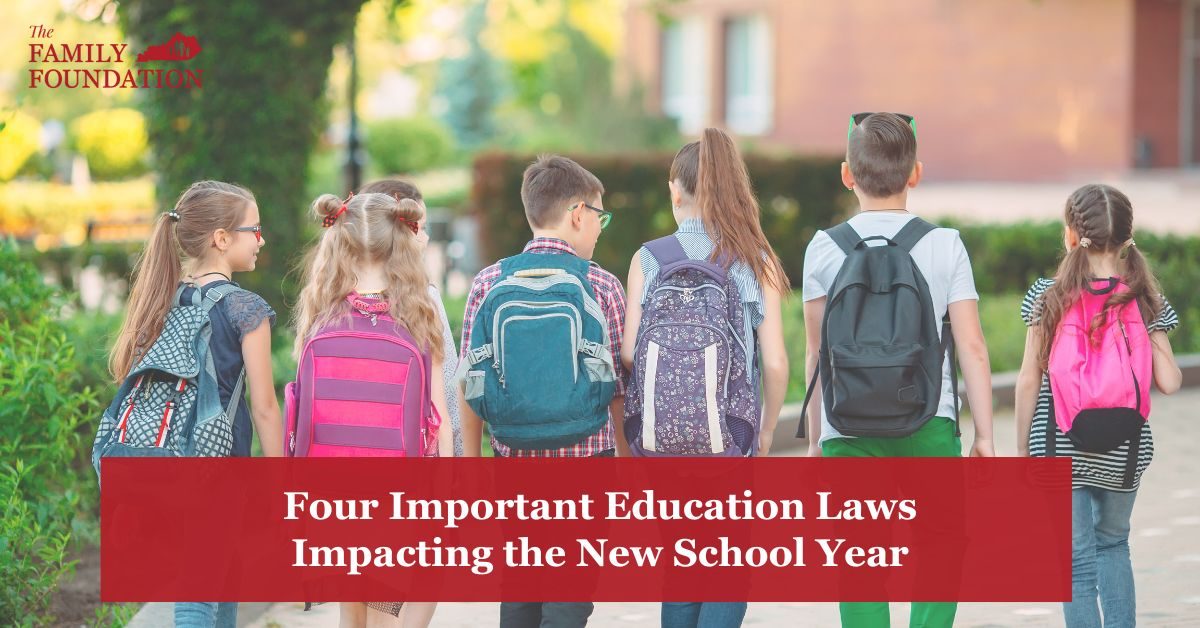As the school bells ring in the start of a new academic year, students, parents, and educators across Kentucky will be greeted not only by fresh notebooks and sharpened pencils, but also by a set of newly enacted laws poised to reshape the state’s educational landscape. Passed during the 2025 legislative session and championed by The Family Foundation, these laws aim to address critical concerns around technology in schools, communication between staff and students, moral instruction options, and the direction of harmful diversity, equity, and inclusion (DEI) programs in higher education.
HB 208: Keeping Phones Out of the Classroom
One of the most significant changes for the upcoming school year is the implementation of HB 208, which targets the growing concern over distractions in the classroom caused by personal technology. Under this law, every local school district is required to establish a policy that prohibits students from using phones and similar devices during instructional time, with a few exceptions.
The rationale is simple: phones can divert students’ attention from learning, expose them to online risks, and undermine the classroom environment. By giving teachers the authority to determine when technology is necessary for educational purposes, the law strikes a careful balance between innovation and discipline. If a lesson plan specifically calls for device use, teachers can permit it—but outside of those moments, phones should remain out of reach.
Parents are encouraged to check with their local school boards for details on specific district policies. This measure is designed to foster a more focused, safer atmosphere for learning, aligning school environments with best practices for healthy childhood development in a digital age.
SB 181: Safeguarding Student Communication
Modern technology has not only transformed how students learn but also how they communicate with teachers, staff, and volunteers. SB 181 was passed to address concerns about inappropriate or unsupervised communications between school employees and students, especially outside of school hours.
According to SB 181, all school staff and volunteers must obtain parental consent before contacting students outside of school-sanctioned, traceable communication platforms. Each school district is responsible for naming at least one approved platform for traceable messaging—ensuring that all interactions are documented and accessible for review if necessary.
This law responds to alarming reports in recent years of improper relationships and attempts by some employees to “socially transition” students without parental knowledge. By requiring transparency and parental oversight for any communication beyond school platforms, SB 181 gives families greater control and peace of mind. If parents suspect a violation, they should immediately notify the relevant school and school district.
SB 19: A Moment of Silence and Moral Instruction
Another notable update is SB 19, which introduces a mandatory moment of silence to begin each school day. Schools must provide at least one minute—and up to two minutes—of quiet reflection where students are asked to remain seated and silent. The moment offers students an opportunity to collect their thoughts and pray as they choose. We encourage parents to discuss with their children the best ways to use this time before classes begin.
SB 19 doesn’t stop at moments of silence; it also opens the door for moral instruction during the school day. The law allows organizations to petition local school boards to provide off-campus Bible classes for up to one hour per week, with students receiving full credit for school attendance during that time. The U.S. Supreme Court, in Zorach v. Clauson, affirmed that such programs are constitutional, provided they are voluntary and held off school grounds.
The Family Foundation has partnered with LifeWise Academy to expand these Bible classes to counties throughout Kentucky. Parents and community members interested in supporting these offerings should contact The Family Foundation, LifeWise Academy, and local school boards for more information.
HB 4: Reshaping Higher Education DEI Programs
While the previous laws focus on primary and secondary education, HB 4 brings sweeping changes to Kentucky’s public colleges and universities. Effective this school year, the bill bans and defunds discriminatory diversity, equity, and inclusion (DEI) programs. It also mandates institutional neutrality, protecting the rights of students and faculty to express their political, social, and religious views freely, without fear of retaliation.
The bill’s intent is to ensure that government-funded institutions do not discriminate or promote ideological conformity. Although these changes do not yet apply to K-12 schools, The Family Foundation has plans to advocate for extending similar DEI restrictions to all grade levels in the future.
Looking Forward: What These Laws Mean for Families
The passage of these four laws marks a pivotal moment for Kentucky’s education system. By restricting phone use and limiting communications, the state hopes to nurture safer, more focused learning environments. The introduction of a moment of silence and off-campus moral instruction strengthens opportunities for student growth—both academically and spiritually. Meanwhile, the overhaul of DEI programs in higher education signals a broader commitment to fairness and free expression. As these new regulations are put into effect, parents, teachers, and students must stay informed and engaged. Understanding the nuances of each law will help ensure a smooth transition and empower families to make the most of the opportunities—and protections—these legislative changes provide.
Whether you are a parent preparing your child for another year in Kentucky’s schools or an educator adapting to new rules, take time to review your district’s policies, communicate with your local board, and advocate for the values that matter most in your community.
Click here to view and download the PDF of the print version of the Citizen paper.

